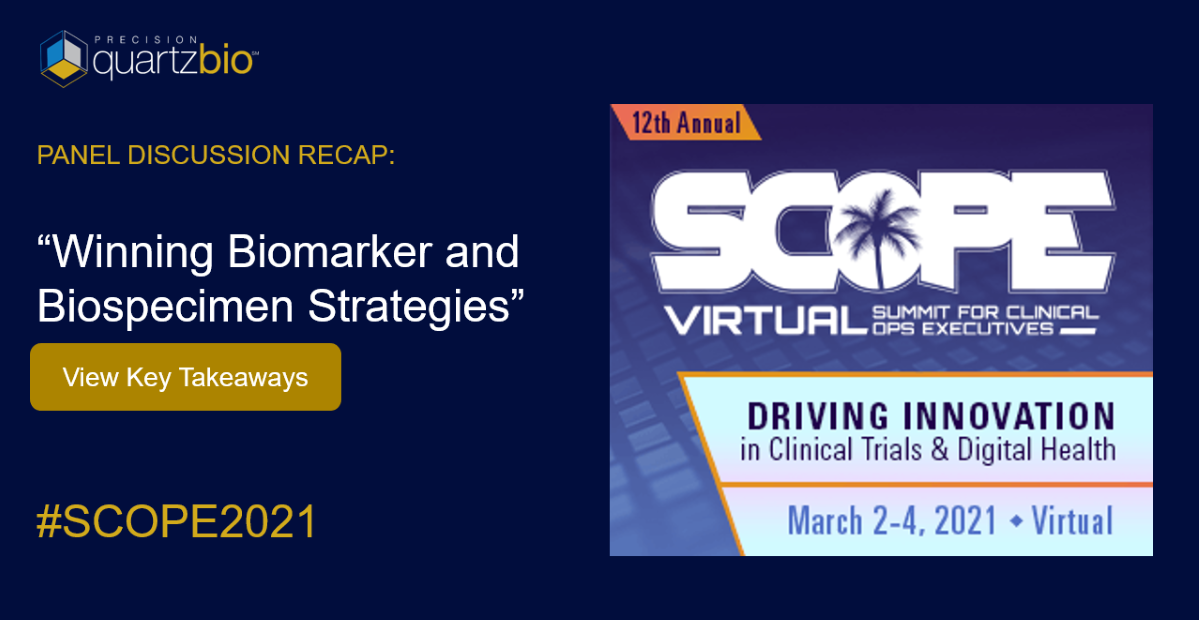
March 8, 2021 — At last week’s SCOPE 2021 virtual summit for clinical operations executives and their partners, an overarching theme was the increased speed of clinical operations in response to the COVID-19 pandemic.
“Speed — is this the new normal? Can we as organizations support that ramped-up speed … with the resources that we all have?” asked moderator Michael Tanen, Director, Clinical Biomarker Specimen Management, Merck & Co., at Tuesday’s panel discussion in the Clinical Biomarkers Operations & Innovations track.
QuartzBio’s SVP of Data Management and Systems Integration, Tobi Guennel, joined leaders from Bristol-Myers Squibb, Eli Lilly, AbbVie, and Covance for this live panel.
Tracking Biospecimens: A Persistent Challenge
Panelists agreed that despite the accelerated innovation in the operations space, tracking biospecimens continues to be a challenge (in line with observations the QuartzBio team shared in 2020). Crystal Dotson-Roberts, Director of CLIA Lab Operations at Eli Lilly, described her COVID-19 diagnostics team’s transition from extremely manual biospecimen management processes to more automated solutions, but warned that this transition required unsustainably long hours and commitment.
As Tobi Guennel put it, “Having the right people coupled with the right technologies” is key to maintain visibilities into samples collections, processing, and storage status throughout the life of a study.
What are the characteristics of “right technologies” necessary to optimize speed?
The Right Technologies Connect Data and Metadata
During the panel discussion, Andrew Jopp, Clinical Data Analyst for AbbVie, described the company’s sophisticated system for analyzing exploratory biomarker data and connecting it to specimen identifiers and clinical data.
Brenda Yanak, VP of Global Biospecimen Management at Bristol-Myers Squibb, proposed that sustaining the pace of clinical development required either more in-house solutions like these, “or that we have vendors coming in to help us with tools.”
In response, Tobi Guennel agreed on the importance of linking exploratory biomarkers to biospecimen-related metadata, reporting that many of QuartzBio’s clients were using the company’s solutions for operational visibility, to streamline key compliance activities, and to integrate assay results data.
The Right Technologies are Adaptable and Ready Right Now
Beyond the obvious logistical challenges and increased focus on maintaining visibility into sample collection and processing status during the course of a study, drug developers are also seeing an urgency to deploy systems that can adapt throughout a study, as new studies are started, or as new labs are added to perform additional biospecimen analyses.
The trend toward decentralization of trials is expected to continue, even outside of COVID-19. For technologies to be adaptable, they will need to be quickly deployable, ready to go from the first patient in, rather than 3-4 months after a study has started.
The connections made at SCOPE gives us hope that the industry will continue to break down siloes and implement best practices for standardizing, conforming and increasing access to data, enabling clinical trials keep up the pace of the past year.

